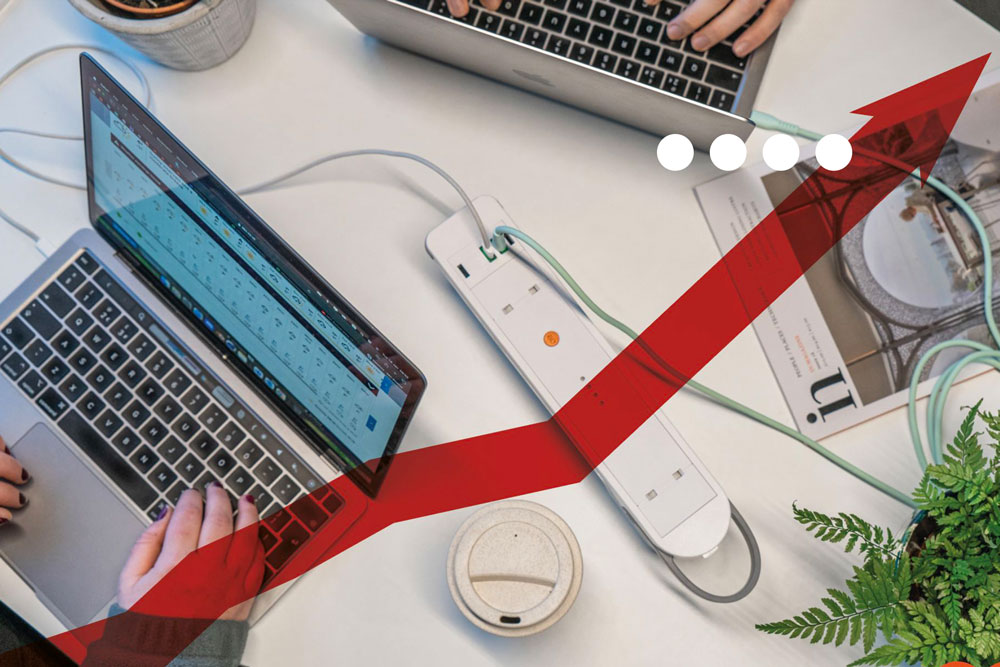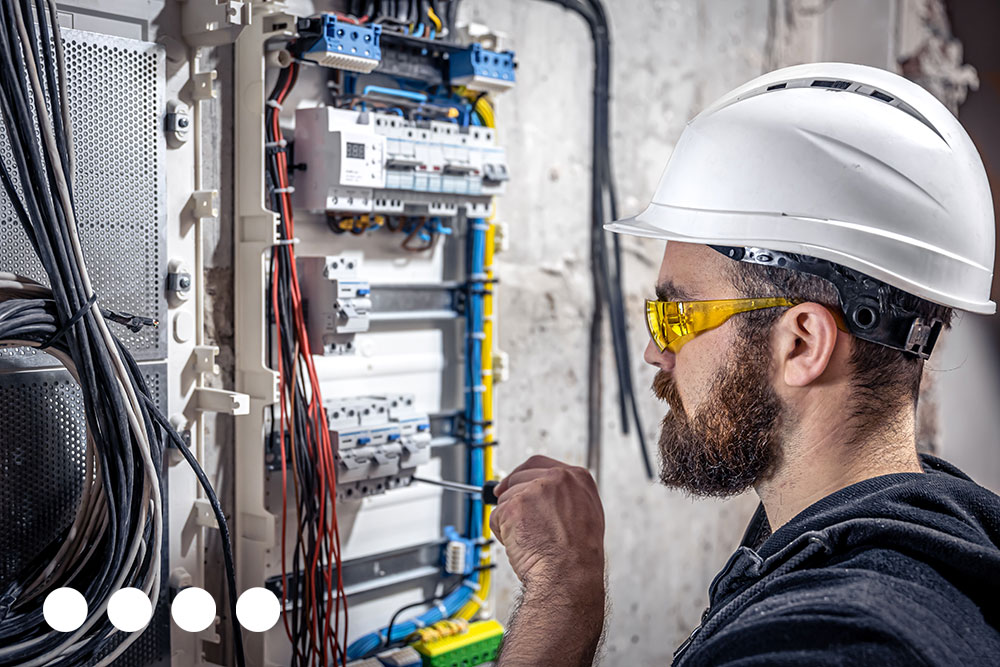COULD BATTERIES CHANGE THE WAY WE DESIGN AND WORK IN OFFICES?

// LITHIUM-ION BATTERIES
“the tethers that tied us to a desk are being cut by increasingly mobile technologies"
Tim Oldman | British Institute of Facilities Management

/ / SAFETY
Safety concerns associated with lithium-ion batteries include the risk of over heating when left in full sun while charging for instance. To address these concerns, robust safety measures, such as advanced battery management systems and thermal monitoring, must be in place to ensure the well-being of personnel and property. OE Electrics QIKPAC, for example, includes safety features that continuously monitor the battery through its integrated battery management system. It undergoes a 30-point factory acceptance test before being shipped, and it is independently certified to ensure safety.
/ / AGILE DESIGN – WITH PORTABLE POWER
The adoption of mobile power in the form of lithium-ion batteries has opened up new design possibilities for workspaces and potential savings in power distribution. By utilising battery power, there is less reliance on hardwired power provision, which can be costly, inflexible, and messy, leading to potential health and safety issues with trailing sockets. Plus, how many broken floor boxes have you seen?
With portable power, furniture can be placed anywhere without the constraint of conventional power sources. Some mobile battery solutions, including OEs QIKPAC, even allow for integration into furniture, providing power not just for laptops but also for second monitors and even the desk itself. This increased flexibility can save time and money while enabling a workspace that can easily adapt to the changing needs of the company.

LONGEVITY
One of the key advantages of lithium-ion batteries is their extended lifespan compared to traditional batteries. This longevity translates to reduced maintenance costs and fewer replacements, making them a cost-effective choice for office applications. The lifespan of a battery depends on factors such as how it is charged and discharged. Fast charging and allowing the battery to completely run out of energy can shorten its lifespan. For example, allowing a Lithium-ion battery to drain to 0% from a top charge of 100% (common practice for cell phones) can result in a decay in power storage after only 500 charge cycles (around 18 months, as is often experienced with mobile phones).
When the charge of a lithium-ion battery is limited, the lifespan increases. For example, QIKPAC is programmed to shut down at 10% and charge only to 90%. This minimal limitation extends the longevity of the battery, increasing its charging cycles to an estimated 1,500 after which its capacity has reduced to 70% of its original capacity. This roughly works out to about 5+ years.


PERFORMANCE
Lithium-ion batteries exhibit high performance efficiency, allowing for quick charging, lower self-discharge rates, and reliable power supply. In the dynamic and fast-paced environment of offices, where uninterrupted power is crucial, the efficiency of lithium-ion batteries makes them a suitable choice. Well-designed battery management systems ensure that batteries can deliver enough power not just for laptops but also for entire workstations or acoustic booths. A suitably sized battery could power these devices for a full workday, and it can be easily recharged overnight.

POTENTIAL COST SAVINGS

// RECYCLING
The production of lithium-ion batteries has raised concerns about reliance on scarce raw materials, but the growth of the battery recycling industry is expected to alleviate this dependence in the future. The rise in electric car production, in particular, has heightened awareness of the need for proper battery recycling. QIKPAC batteries use the same cells as those used in car manufacturing, making it easier to recycle these common battery cells.
// CONCLUSION
In conclusion, lithium-ion batteries offer a promising solution for powering workspaces that prioritise flexibility, efficiency, and sustainability. Their high energy density, longer lifespan, and environmental friendliness make them a compelling choice, along with the potential financial savings compared to conventional electrical installations. However, selecting the most suitable battery solution requires careful consideration, rather than simply going for the most aesthetically appealing or least expensive option. OE Electrics offers a scalable mobile battery solution that can grow with businesses, ensuring safety and reliability.
If you would like to know more about using battery power in your projects get in touch here
| Cookie | Duration | Description |
|---|---|---|
| cookielawinfo-checkbox-analytics | 11 months | This cookie is set by GDPR Cookie Consent plugin. The cookie is used to store the user consent for the cookies in the category "Analytics". |
| cookielawinfo-checkbox-functional | 11 months | The cookie is set by GDPR cookie consent to record the user consent for the cookies in the category "Functional". |
| cookielawinfo-checkbox-necessary | 11 months | This cookie is set by GDPR Cookie Consent plugin. The cookies is used to store the user consent for the cookies in the category "Necessary". |
| cookielawinfo-checkbox-others | 11 months | This cookie is set by GDPR Cookie Consent plugin. The cookie is used to store the user consent for the cookies in the category "Other. |
| cookielawinfo-checkbox-performance | 11 months | This cookie is set by GDPR Cookie Consent plugin. The cookie is used to store the user consent for the cookies in the category "Performance". |
| viewed_cookie_policy | 11 months | The cookie is set by the GDPR Cookie Consent plugin and is used to store whether or not user has consented to the use of cookies. It does not store any personal data. |